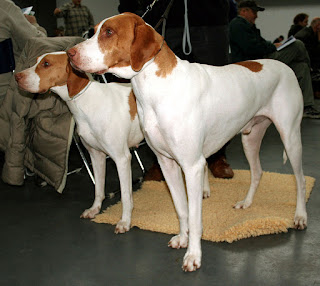The
Braque Saint-Germain (FCI No. 115) (translated into English as the St. Germain
Pointing Dog) is a medium-large breed of dog, a versatile hunter used for hunting
as a gun dog and pointer as well as for hunting other small game. Braque is a
term meaning pointing dogs. The breed was created around 1830 by crossing
English and French pointing type dogs.
Appearance
A
typical pointer, with a medium build and an attractive fawn and white coat,
drop ears, and a long tail which is held level while the dog is working. The
Braque Saint-Germain stands 56–62 centimetres (22–24 in) at the withers,
females somewhat smaller.
History
Bred
first in the royal kennels at Compiègne around 1830 from a mix of English and
Continental pointers, the breed grew in fame in Saint Germain en Laye, where it
received its name. Although a popular hunting dog, the breed achieved its
greatest fame as a showdog. Starting from the first dog show in France in 1863,
it was the most shown pointing breed. The French breed club was established in
1913. The breed is recognised internationally by the Fédération Cynologique
Internationale in Group 7, Pointing Dogs, Section 1.1 Continental Type Pointing
Dog. It is also recognised in North America by the United Kennel Club as of
2006. The breed is also recognized by a number of minor registries, hunting
clubs, and internet-based dog registry businesses, and promoted as a rare breed
for those seeking a unique pet.
Health and temperament
No
unusual health problems or claims of extraordinary health have been documented
for this breed. Temperament is described in the breed standard as having a soft
mouth (for retrieving without damaging the game), handles rough treatment well,
and is a "hunter above all" that appreciates living with its human's
family.






No comments:
Post a Comment